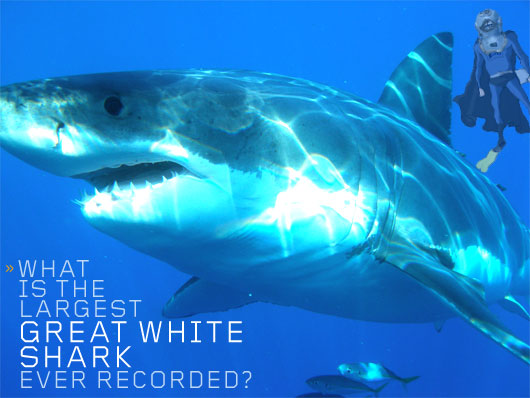Everybody has that moment when they realize they don’t know about something that they should probably know about. Whether it’s history, language, science, or cultural phenomena, you’ve felt the stinging personal embarrassment of a moment wherein you realize there’s some common knowledge that isn’t so common. Don’t feel bad; nobody knows everything. Nobody, that is, except me and my sidekick, The Internet!
Somewhere in the world, a confused soul begs the question…
What is the Largest Great White Shark Ever Recorded?
Maybe it’s just me but whenever I used to swim in the ocean (I haven’t been in years, for various shark-related reasons), I would always have that moment where I would picture just how large the shark from Jaws would be, if it swam up alongside me (in the film, Quint notes that the fish is 25 feet long). Following this thought, I would naturally freeze in panic. But I would always wonder.
Was my fear and imagination justified? Did Peter Benchley and Steven Spielberg lie to me? What’s the largest great white shark ever recorded?
Note: I specified “great white shark” because technically, the largest shark of any specific species would always be the whale shark which – though incredibly huge and cool-looking, with the spots – is a boring, filter-feeding sea cow whose record measurements aren’t nearly as interesting as the creature that inspired Jaws. So, yes: we’re looking for the largest predatory shark, which subsequently means the largest Great White.
Whenever delving into the information contained in a “largest [certain type of animal]” discussion, one needs to employ a healthy amount of skepticism. Think about it: if you caught a giant shark or crocodile, wouldn’t you exaggerate the actual measurements a little bit, to embellish the story for the story’s sake? Exactly. This sort of thing happens a lot.
Examples:
- A Great White caught near Cuba in 1945 was said to measure in at 21 feet, 7000 pounds; there’s even a pretty terrifying picture of it with a bunch of folks from the village. Naturally, this sort of claim drew the attention of experts. Upon further inspection, researchers estimate that the giant Cuban shark was actually about 16 feet long.
- A Great White caught off the coast of Malta in 1987 was said to measure in at 23 feet. Further studies, however, indicate that that measurement was exaggerated.
Conversely, when it comes to record-setting fish measurements, time can sometimes turn what was once a very scientific process into a tall tale (or, in this case, “a long tail”). Because fish are comprised mostly of water, extended time spent out of water post-mortem can lead to significant shrinkage. A fisherman may catch a Great White and measure it at 20 feet long but when the shark is brought to an official source for measurement a few days later, it may only measure 17 feet (this may have happened with the aforementioned Cuban and Maltese sharks, for all we know).
According to the Discovery Channel, the world’s largest accurately measured Great White was 20 feet long, caught off Prince Edward Island in Canada in 1988 (experts believe that 20 feet is probably the maximum size for a great white). Unfortunately for fishermen hoping to set records, most Great Whites measure between 13 and 16 feet (and under 3000 pounds).











![It’s Time to Begin Again: 3 Uncomfortable Frameworks That Will Make Your New Year More Meaningful [Audio Essay + Article]](https://www.primermagazine.com/wp-content/uploads/2025/01/begin_again_feature.jpg)




